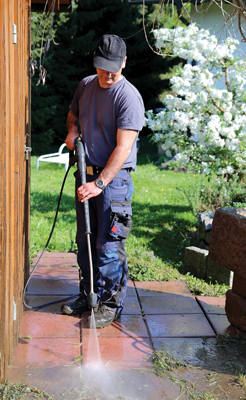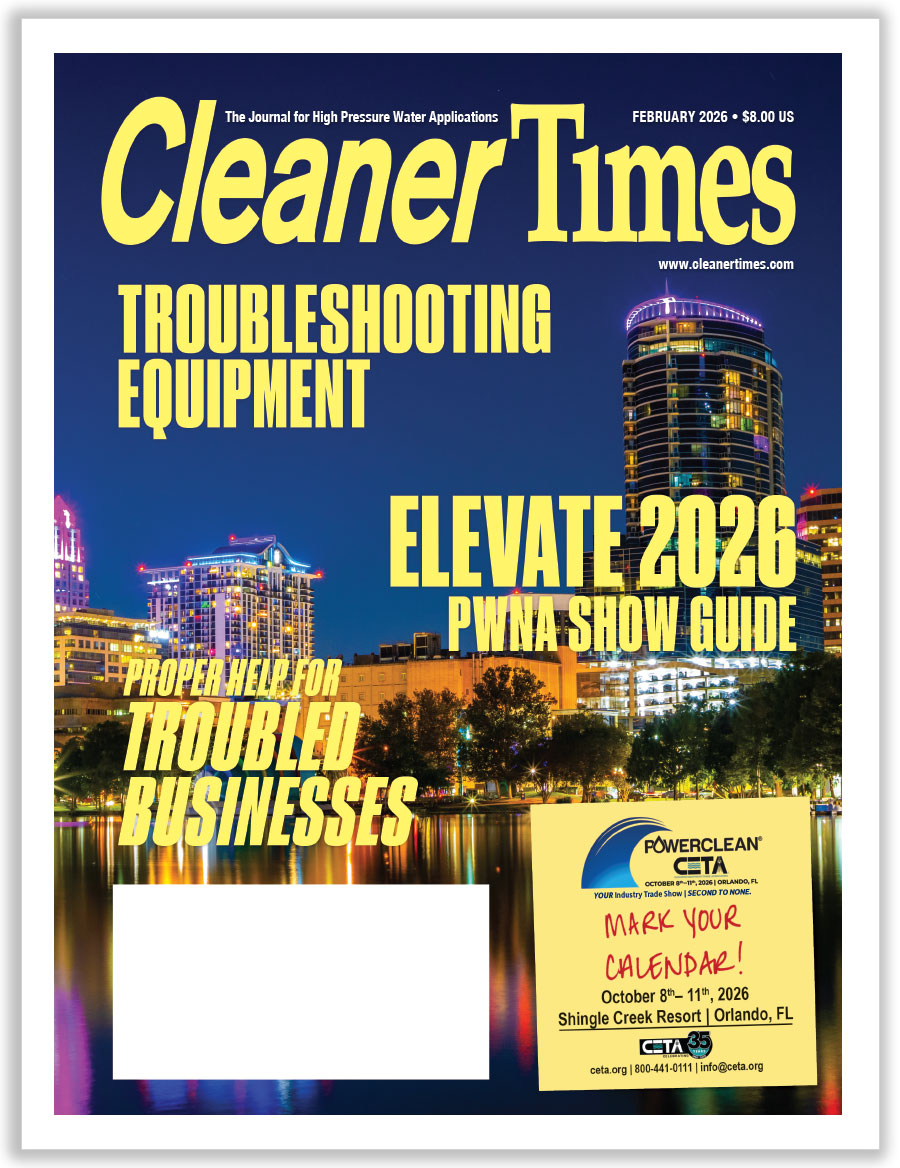
What You Need to Do to Get a Jump on Spring Cleaning
By Mike Dingler – Firehouse Pressure Washing/ Published April 2021

“Springtime, springtime is just around the bend, springtime, springtime where the job requests never end,” is a song I like to sing to in the middle of February to remind myself that it will get better and business will pick up. We all take a hit in the winter as pressure washing is a seasonal business; some of us are hit more than others, and it all depends on location and the socioeconomic status of the communities in which we live. In Georgia and Florida, work will pick up sooner, and we typically have a mild fall/winter with not much slowdown in work until December; then we typically pick back up in mid-February to early March. This is a dream scenario for exterior cleaning companies in the North, as they experience many months of wintertime temperatures coupled with snow and ice, making their spring delayed as compared to the South. We all have a spring cleaning rush in some form, but some may be sooner or later or longer than others. What we do to prepare for this rush is paramount to our success and the most income in the busiest time of our season.
A few things you should be doing every winter include changing machine oil, pump oil, etc., and everyone is familiar with these procedures, but there is so much more you can be doing in your downtime to make the upcoming spring the best income-generating time of the year. Take a day or two to inspect your rig(s) front to back and find any problems (or potential problems). Then use this time to repair and replace any issues you find. Fuel hoses dry rot, water hoses leak, pumps lose their oil fill caps, etc., and all this can lead to premature failure of equipment at the time we need it most. A previous article in Cleaner Times addressed what a solid repair shop/distributor should look like, and guess what they look like in the springtime? Full of rigs waiting for repairs, and while rigs are in queue to be repaired, they are not producing income; they are consuming it. This is why it is so important to do what we can in the off season to combat this issue.
“Preventive maintenance” is defined as “maintenance that is regularly performed on a piece of equipment to lessen the likelihood of it failing.” It is performed while the equipment is still working so that it does not break down unexpectedly. So, anything you do in the off season to circumvent equipment failure in the field is known as preventive maintenance. This is where most exterior cleaning contractors fail to do what is necessary because it isn’t technically broken yet, and as the old adage goes, “If it isn’t broken, then don’t fix it.” However, we must do our best while inspecting our rigs to ensure it doesn’t break, so that includes taking steps to ensure the equipment has longevity and durability in the field. Greasing all 3/8-in and ¼-in. fittings is a great place to start as it gets your hands on every fitting and associated length of hose on your rig. Greasing the bearings on your reels is another great thing to do, as is greasing and oiling all moving parts on your surface cleaners. Trigger guns or any pressure hose connections that leak put an unnecessary workload on the unloaders, which leads to premature unloader failure, and that means premature expenses on replacing unloaders. Burner systems should be dissembled and properly cleaned, removing all soot from the electrodes. Burners should then be operated to ensure proper flow of fuel through the nozzles within the burner, and changing of the nozzles may be necessary. Every fuel filter on your rig should be inspected and changed if any residue or cloudiness is noted in the reservoir prior to the fuel passing through it. Inline water filters coming off of the supply tank to the pump should be inspected and flushed as well. You should know where every filter is on your rig and make sure they are all inspected and/or replaced prior to the springtime rush to ensure your day doesn’t come to an abrupt stop due to a five-dollar filter. Also, if you are storing your machines for a long winter, it is best to run ethanol free fuel and/or a fuel stabilizer so your carburetor doesn’t have problems when you first go back to work.
One of the best things to do in the off season is compose a list of all moving parts on your rig and assure you can locate that part quickly. A part that comes to mind is Honda GX690 ignition coils. Sometimes these can be very difficult to find, and a long wait for shipping may present itself. Remember that each day your rig needs an ignition coil is a day that rig isn’t working, and that depletes your income each and every hour it sits idle. A great way to combat this is to make a parts locker. A parts locker should contain everything you need to keep your business operating at peak performance. Here is a list of what I keep in my parts locker:
- (1) 8 gpm pump
- (4) Pressure guns
- (2) Honda GX690 ignition coils
- (10) Chemical injectors
- (4) Jrod assemblies with nozzles
- (4) Brush heads
- (5) 50-ft. length of dual braid pressure hose
- Tackle Box with all 3/8-in. and ¼-in. fittings we use on the rigs in quantities of 5–10
- 1 extra tank cap for all tank sizes on our rigs
- Large quantity of 3/8-in and ¼-in. O-Rings
- A roll of hose for every diameter on our rigs (fuel, bypass, water, chemical, and air hose)
- Whip hose—various lengths
- Spark Plugs
- Oil Filters
- Fuel Filters
- Motor Oil
- Pump Oil
You can stock your parts locker a little at a time until you have a large collection of parts by simply ordering one additional quantity of the part(s) you order throughout the year (as wintertime isn’t typically the time we want to spend a lot of money on spare parts). This spreads out the expense over the entire year, and in turn, you stock a locker that may save you a week or two of downtime.
When it comes to preventive maintenance, our bodies and minds should not be omitted. Use your downtime to read up on the latest exterior cleaning tools and techniques, or read a business book on marketing, growth, sales, etc. to better yourself before the work starts to flow. Go to the gym, exercise, and feed your body and mind right so it operates at peak performance when you need it the most.
Remember that preventive maintenance and repair are two very different things, and you do not want the latter. The goal is to regularly inspect everything we use to make our business run smoothly and efficiently and get in front of any problems before they are in need of repair. Studies of what would happen if all humans were to disappear from the earth are very conclusive when it comes to one thing; without preventive maintenance almost every single thing we humans have made will eventually fail and break and return to the earth, from the Hoover Dam to a pressure washer and everything in between, so make sure you use the off season to your fullest advantage by scrutinizing every piece of equipment before repair or replacement is necessary!
Mike Dingler is owner of Firehouse Pressure Washing, Soft Washing, and Roof Cleaning Inc. He has been in the exterior cleaning industry since 1996. In addition, his book, Small Service Based Business Basics: How to Run Your Business and Not Let Your Business Run You, is available on Amazon. For more information, call (770) 468-0014 or visit www.firehousepowerwash.com.






